|
|
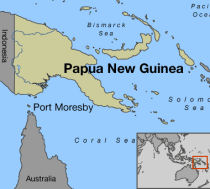 The Malaria Block, by Waldo Bien The Malaria Block, by Waldo Bien
During the period 1990-1991, I lived and worked in Berlin. I had been working on the series “Tableaux Africain” and the “Numeri” portraits in whale oil. One day I visited the exhibition “Notes”, by the British painter Ian McKeever at the D.A.A.D Gallery. Subject of his work was the “History of Rocks”, the metamorphosis of amorphous rock, a theme I was interested in my self, since years. In a guiding catalogue I read that the artist gathered impressions on working trips around the world. I wanted to meet him. This wasn’t difficult since we were both benefiting from a Berlin Grant and our studios were just half a mile away from each other, along the Berlin Wall. Entering McKeever’s studio, I noticed a Papua New Guinea map, pinned onto the wall. The same map I had hanging in my own studio. We happened to both be planning a visit. After two cups of tea we agreed to undertake the trip to P.N.G. together.
We traveled via Australia to study Aboriginal rock paintings in the Central and the Northern Territories. It’s interesting to travel with a colleague who works in another discipline. Our approach towards things was often quite different and resulted in inspiring dialogues.
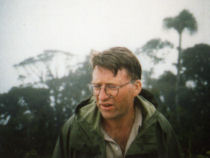 In P.N.G. we went to those areas that are usually not recommended to visit. We dragged through the jungle, our heads wrapped in fishing nets to keep the mosquitoes away. We worked every day, with the exception of those days we spent on the upper Sepik River. There it was so incredibly humid that paper just refused to dry and our gear including our selves started rotting away. In the village Anguganak we where asked by the Big Man to exhibit our watercolours in a large hut. With the drum the event was announced for the next morning. We could hardly believe that this would work. The next morning a large crowd came slowly dripping into the settlement from all directions to see the show. Big flat feet shuffled over the clay floor along artworks. We listened to their comments. Things were identified without surprise. “Smoked body’s”, tree mummies drawings from another district. Abstract forms and expressions as well: An orange stain happened to be a specific nut tree blossom, others expressed a jungle season or a special rock in the bend of their river and so on. Everything could be placed into the connotations of their personnel daily life. In P.N.G. we went to those areas that are usually not recommended to visit. We dragged through the jungle, our heads wrapped in fishing nets to keep the mosquitoes away. We worked every day, with the exception of those days we spent on the upper Sepik River. There it was so incredibly humid that paper just refused to dry and our gear including our selves started rotting away. In the village Anguganak we where asked by the Big Man to exhibit our watercolours in a large hut. With the drum the event was announced for the next morning. We could hardly believe that this would work. The next morning a large crowd came slowly dripping into the settlement from all directions to see the show. Big flat feet shuffled over the clay floor along artworks. We listened to their comments. Things were identified without surprise. “Smoked body’s”, tree mummies drawings from another district. Abstract forms and expressions as well: An orange stain happened to be a specific nut tree blossom, others expressed a jungle season or a special rock in the bend of their river and so on. Everything could be placed into the connotations of their personnel daily life. 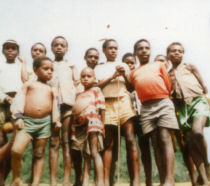 McKeever’s ‘abstract’ expressions were naturalism here. In a classroom of a local school, there was a map of the world, framed by the children with archaic ancestor masks made out of banana leaves. McKeever’s ‘abstract’ expressions were naturalism here. In a classroom of a local school, there was a map of the world, framed by the children with archaic ancestor masks made out of banana leaves.
There were weeks we didn’t feel to fine, felt like wet towels, rested in the humid smoky darkness of huts on sago leaves with feverish exotic dreams, too weak to get up. Once in a while nevertheless forcing our selves to ‘throw’ a drawing, proving that we were still alive. My mother said; ” Going to such places is asking for trouble. Be wise, stay home.” But what’s ’home’? What’s ‘wise’?
|
|
|
|
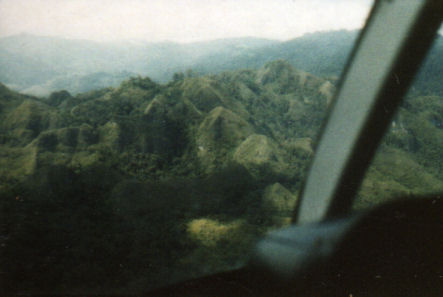 Big Man, by Waldo Bien Big Man, by Waldo Bien
When the plane makes a sharp curve and passes in-between two mountains, we see a short and narrow landing strip in front of us, driftwood in the jungle ocean. We had booked to be brought to another valley, some 20 miles away, but jungle fog had not allowed us to land. We would be dropped here now and wait till the pilot would return, which could take days. Along a slow meandering river some huts were spread. We dashed over treetops and straight down, catching the beginning of a short and uphill running airstrip. At the end of it the pilot quickly turned the plane around, jumped out, blocking the wheels. Then hurry hurry our baggage is thrown on the ground. The pilot asks if we are sure we want to stay here; “I still can take you back”. We stay. The plane rolls down hill, pulls straight up, disappears with the same speed as it fell out of the sky, swallowed by dark grey clouds, slowly strangling the noise of the motor, leaving overwhelming silence and exotic grandeur.
Minutes later the jungle curtain is opened. Some traditional dressed Papua’s come our way. Exciting greeting. Pidgin English. They insist that we follow them into the jungle, along fresh cut eucalyptuses and wading through small rivers. The procession is getting longer and longer with children and men with bows and arrows, some in torn T-shirts and pants. A man walks on one shoe. At a corral we come to a halt. The man in charge tells us to stay there and wait. He steps through the gate between some blue/black pigs that have been blinded for the owner’s comfort so they wouldn’t run to far away. He returns with the Big Man, the local Chief. We are invited to enter his domain. The guide is told to follow and report. Woman and little girls are ordered to retreat into a nearby hut. Smoke shreds and giggles penetrate through its walls. Eyes peep through a crack in the door. Only the pigs are ignorant of our visit.
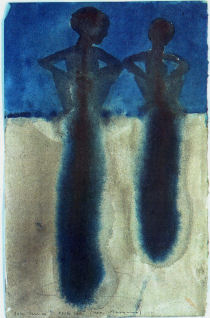 We go to the Long House, a 25 meters long hut on poles and exclusive domain of the men. Fresh cut banana leaves are brought, spread on the floor to sit on. We’re welcomed. The man who found us reports, answers Chief’s questions. Our luggage is brought in now, raising curious attention. The Chief looks at us with a smile. Determination. He than announced us as Big Man colleagues from far away who have come to visit him. A Big Man is not, as one would expect, a wealthy person who gathered ‘much bilonging,’ but ‘Big’ cause he is giving his ‘bilongings’away to the people as presents. Power is based on giving, not taking. The rules are simple: A received present (or favour) has to be matched with a counter present. A risky game to be invited into, like Russian roulette, rising stakes. I took out cooking gear to boil some water. The Chief rejected, yelled a command to an invisible person outside. Later the door opened, just far enough to allow a dark hand to push a kettle brackish lukewarm water inside. My teabag was admired, went from hand to hand, than ‘unwrapped’ by the Chief himself. Mixed into the water it made up a peculiar drink in full harmony with the surrounding. He explained to his men that this was called tea. We go to the Long House, a 25 meters long hut on poles and exclusive domain of the men. Fresh cut banana leaves are brought, spread on the floor to sit on. We’re welcomed. The man who found us reports, answers Chief’s questions. Our luggage is brought in now, raising curious attention. The Chief looks at us with a smile. Determination. He than announced us as Big Man colleagues from far away who have come to visit him. A Big Man is not, as one would expect, a wealthy person who gathered ‘much bilonging,’ but ‘Big’ cause he is giving his ‘bilongings’away to the people as presents. Power is based on giving, not taking. The rules are simple: A received present (or favour) has to be matched with a counter present. A risky game to be invited into, like Russian roulette, rising stakes. I took out cooking gear to boil some water. The Chief rejected, yelled a command to an invisible person outside. Later the door opened, just far enough to allow a dark hand to push a kettle brackish lukewarm water inside. My teabag was admired, went from hand to hand, than ‘unwrapped’ by the Chief himself. Mixed into the water it made up a peculiar drink in full harmony with the surrounding. He explained to his men that this was called tea.
 “Are you working for the government’? No! ‘So you are missionaries?” No, no! “Ahhh, I see, you work for the oil company”. Neither, no. They looked surprised. “No one ever comes here who is not sent” To explain, Ian and I showed our sketchbooks with the drawings and notes from past weeks. Every drawing we showed caused headshaking accompanied by a long sharp ‘TSSSSSSS”, pressed with the tip of the tongue between front teeth. More hands reached trough the door, bringing wooden bowls with rice and some smoked sago worms. We ate under an avalanche of questions and answers, bananas for desert. We informed how far it was to the next best landing strip. “Five hours” Chief answered with a resolute nod. “If you go slow, six hours, if you go very slow, longer.” We enquired about porters and a guide. Two men where brought in and introduced. The chief set the overrated price and announced that we would go to sleep now, break up at sunrise. Than the light was extinguished. I went out to have a slash, stumbled over one of those blind pigs scraping around the huts, released from day/ night terror. That’s how the night started. “Are you working for the government’? No! ‘So you are missionaries?” No, no! “Ahhh, I see, you work for the oil company”. Neither, no. They looked surprised. “No one ever comes here who is not sent” To explain, Ian and I showed our sketchbooks with the drawings and notes from past weeks. Every drawing we showed caused headshaking accompanied by a long sharp ‘TSSSSSSS”, pressed with the tip of the tongue between front teeth. More hands reached trough the door, bringing wooden bowls with rice and some smoked sago worms. We ate under an avalanche of questions and answers, bananas for desert. We informed how far it was to the next best landing strip. “Five hours” Chief answered with a resolute nod. “If you go slow, six hours, if you go very slow, longer.” We enquired about porters and a guide. Two men where brought in and introduced. The chief set the overrated price and announced that we would go to sleep now, break up at sunrise. Than the light was extinguished. I went out to have a slash, stumbled over one of those blind pigs scraping around the huts, released from day/ night terror. That’s how the night started.
The chief woke us at sunrise. Handed each of us a necklace with seeds. We parried the attack with some painkillers and some shaving soap. He then went into the corner to a little pile of exchange goods, nick knacks that hadn’t been there the evening before and handed us a calabash, shrewd awaiting our counter gift. I cut 20 cm of my Stanley measuring tape, a red pencil and sunglasses with a broken glass. He turned to the pile in the corner again, came back with a bird of paradise carcass, stripped from feathers.
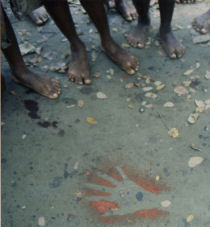 From the depth of my pocket I pulled out a forgotten guilder with the portrait of our Queen whom he instantly adored. The porters arrived, ending the game. To our astonishment they carried a pig, wrapped in a fishing net, that had the same destination as we did, part of an outstanding bride price. If they would carry this pig they could no possibly also carry our luggage. We protested. This caused laughter and they convinced us that this would be no problem at all. So we left into the jungle, not before we promised to send the Chief a red coat, shoes and a watch. Also, leaving our address because he had the intention to come on a return visit. With great speed, unhindered, as it seemed by pig and luggage, we rushed over slippery jungle tracks, constantly changing direction like a drunken compass, crossing rivers, sweat soaked climbing, descending. After several exhausting hours they suddenly stopped, explained that this was the end of Big Mans territory. They refused to continue. The fee had to be doubled. From the depth of my pocket I pulled out a forgotten guilder with the portrait of our Queen whom he instantly adored. The porters arrived, ending the game. To our astonishment they carried a pig, wrapped in a fishing net, that had the same destination as we did, part of an outstanding bride price. If they would carry this pig they could no possibly also carry our luggage. We protested. This caused laughter and they convinced us that this would be no problem at all. So we left into the jungle, not before we promised to send the Chief a red coat, shoes and a watch. Also, leaving our address because he had the intention to come on a return visit. With great speed, unhindered, as it seemed by pig and luggage, we rushed over slippery jungle tracks, constantly changing direction like a drunken compass, crossing rivers, sweat soaked climbing, descending. After several exhausting hours they suddenly stopped, explained that this was the end of Big Mans territory. They refused to continue. The fee had to be doubled.
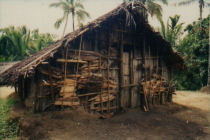 Ian and I discussed the situation, decided to played it hard, saying we would carry our own bags and find our way. They dropped the luggage, left with the pig into dark unknown green. We sat down, smoked cigars and cooked some tea. McKeever took his sketchbook, made some notes. I cleaned my hair and face from spider web, scratched my back along the bark of a tree. Ian and I discussed the situation, decided to played it hard, saying we would carry our own bags and find our way. They dropped the luggage, left with the pig into dark unknown green. We sat down, smoked cigars and cooked some tea. McKeever took his sketchbook, made some notes. I cleaned my hair and face from spider web, scratched my back along the bark of a tree.
Half an hour later they returned, surprised to find us so relaxed and in good mood. The fee was reset and we left again, crossing steeper mountains now. One hour later they were exhausted and our speed dropped dramatically. The only way to continue would be if we would carry their pig. So we did, stumbled along. Every half an hour they made us stop to feed it with greens and roots. The condition of the pig seemed their only concern. After eight hours we informed how far still to go. They looked up in the sky: our destination was right behind this hilltop. After 12 hours bushwalking and several more hilltops crossed it was getting dark and dangerous to walk. With pig and flashlight we took the lead, leaving them more and more behind. Heavy rain started to pour down on us. We came to a roaring river, crossed over a slippery fallen tree. Some huts popped up in the fog and a yellow rectangle, illuminated window of a wooden barrack, a medical post. We walked up to the open door. Inside a naked man was lying on a table. The poor chap had fallen out of a coconut tree and landed on his stretched leg. This had become dislocated and was much shorter now. Three locals assisted a medic pulling it all back into place, bit-by-bit, using great force. We, exhausted, paralysed, stood all the time in the doorway. Mud and shit all over. The pig, sleeping peacefully in our arms.
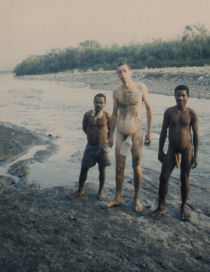 Next morning we noticed that the cemetery was located right next to the hospital. A little further the landing strip. A man was lying on his back there, smoking a newspaper rolled cigarette with a portrait of Bob Hawk. Next morning we noticed that the cemetery was located right next to the hospital. A little further the landing strip. A man was lying on his back there, smoking a newspaper rolled cigarette with a portrait of Bob Hawk.
I asked him: “Is there a plane coming today?”
“No”
“Is there a plain coming tomorrow?”
“No”
“Do planes land here?”
“Yes”
“So, when is the next plane coming?”
“ It sometimes comes tomorrow”.
|
|